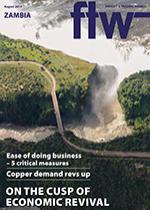At one level Zambia has everything going for it – growing global demand for copper and cobalt will raise prices and support more investment in Zambia and the neighbouring Democratic Republic of Congo.
Agriculture is starting to revive – and that is important because it is more sustainable over the long term, and is labour-intensive.
With the world rapidly running out of space to produce food for its growing population, countries like Zambia are in a potentially powerful position.
Potential arable land covers 47% of the country’s total land area of around 752 614 square kilometres, but at present only 15% of this is under cultivation, according to the World Factbook.
Government has recognised the potential. The Zambian Revenue Authority has issued guidelines which state that there is no import duty on irrigation equipment and reduced duty rates on imports of other farming equipment.
There is also a reduced customs duty at 5% on pre-mixes, being vitamin additives for animal feed, and VAT deferment on importation of some agricultural equipment and machinery – among a list of other incentives.
There are similar incentives for a range of other products. And there are signs that the incentives are having an impact. Freight forwarders and hauliers interviewed by FTW report growing volumes of agricultural and manufacturing-related machinery and products.
But – and this is the other level – investors are holding back due to political uncertainty in Zambia itself, as well as neighbouring countries – all the way down to South Africa. Lack of job-creating investment creates social risks.
Higher unemployment will see the youth and other disgruntled citizens taking to the streets. Potential investors in the manufacturing, mining and agricultural sector will be carefully monitoring political developments.
A shift in focus towards inclusive growth rather than power will pave the way for massive investment – and opportunities for the logistics sector.


